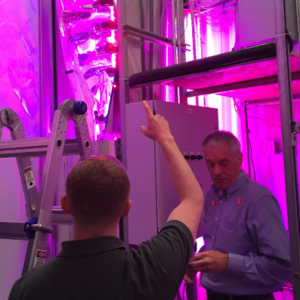PHYCO2 algae pilot program with MSU reaches new milestones

Photo: PHYCO2
October 16, 2018
BY PHYCO2
PHYCO2 LLC reached a new milestone in its three-year pilot program with Michigan State University, announcing the operation of its new, scalable algae production technology reactor, which will reduce the level of carbon emissions produced by electric power generation boilers.
In 2015, PHYCO2 engaged with MSU to test its patented algae photobioreactor (APB) design. The tests demonstrated that the reactor was stable with the continuous operation of algae production for more than five months without extensive biofouling. In 2017, MSU received a three-year DOE grant to develop a new approach to carbon capture technology development. PHYCO2 was chosen as MSU’s partner to absorb a portion of the CO2 emissions from the combustion boilers at the T.B. Simon power plant and grown algae. The algae will then be converted via a chemical cascade process into several chemicals, including an amine that will be used for the bulk of the CO2 capture process at the power plant. The other chemical products have commercial applications. To date, the PHYCO2 algae reactor has operated continuously for more than seven months and is still running.
A new 1,000-liter reactor, based on a new patent-pending APB design, was also built and put in service. The new design builds upon the earlier research with lower anticipated operating costs, scalable design and higher productivity rates. The conversion process transforms CO2 to algae, which then can be used for a multitude of products, including nutrition for humans and animals, cosmetics and pharmaceuticals.
Dr. Wei Liao, MSU associate professor and director of the Anaerobic Digestion Research and Education Center, Department of Biosystems & Agricultural Engineering and advisor to PHYCO2’s testing program, said, “This program with the Department of Energy and PHYCO2 aligns our long-term research with algae systems, carbon capture and sequestration, and brings in a new element of chemical synthesis pathways with organic feedstocks.”
William Clary, PHYCO2 president and CEO stated, “The studies conducted at MSU with PHYCO2’s algae photobioreactor represents the growth and development of future food sources and environment-saving technology that truly is market sustainable. The technology development allows PHYCO2 to continue to be at the forefront of cutting-edge research and development. The collaboration is a direct response to the current global demand of cost-competitive algae sources and CO2 emission reductions. New protein sources, health drinks and infant formulas are just a few of the many types of products that will be impacted by the production of this pure microalgae. Our goal guarantees the continued growth of one of nature’s most essential organisms—high-value, pure, microalgae. Together, with MSU, our team is transforming innovation that will help improve the everyday lives of people around the world.”
Advertisement
Advertisement
Related Stories
The USDA reduced its estimate for 2024-’25 soybean use in biofuel production in its latest WASDE report, released May 12. The agency expects soybean oil use in biofuel to increase during the 2025-’26 marketing year.
HutanBio's microalgal biofuel production shown to be net-negative in an independent life cycle assessment by EcoAct
HutanBio on May 8 announced that the production process for its proprietary HBx microalgal biofuel achieves net-negative carbon emissions, based on an independent cradle-to-gate life cycle assessment (LCA) conducted by EcoAct.
According to a new economic contribution study released by the Iowa Renewable Fuels Association on May 6, Iowa biofuels production has begun to reflect stagnant corn demand throughout the agriculture economy.
Repsol and Bunge on April 25 announced plans to incorporate the use of camelina and safflower feedstocks in the production of renewable fuels, including renewable diesel and sustainable aviation fuel (SAF).
U.S. operable biofuel capacity in February was unchanged from the previous month, according to data released by the U.S. EIA on April 30. Feedstock consumption for February was down when compared to both January 2025 and February 2024.
Upcoming Events










